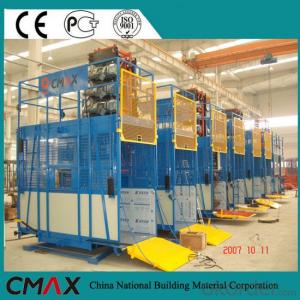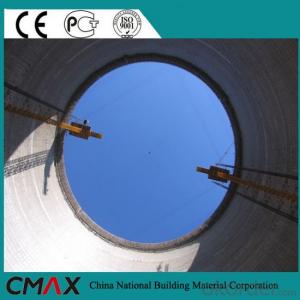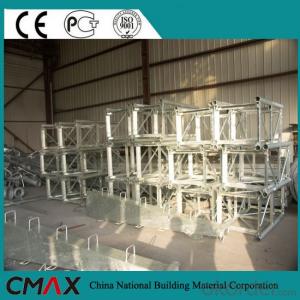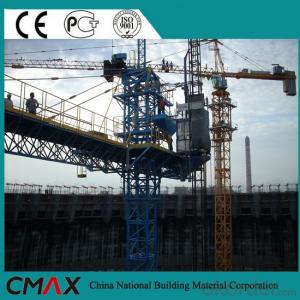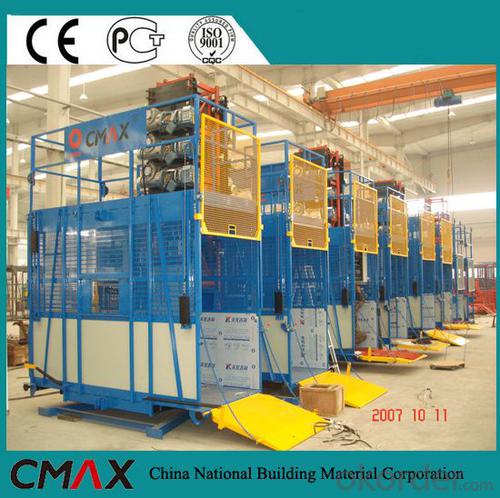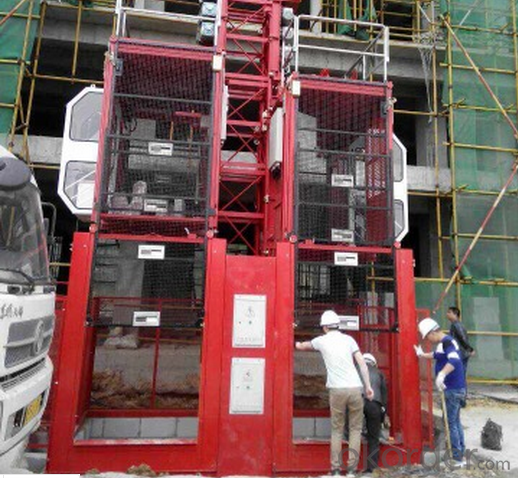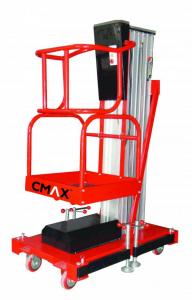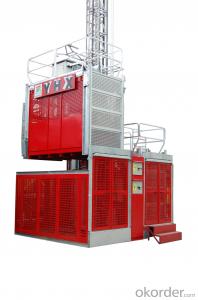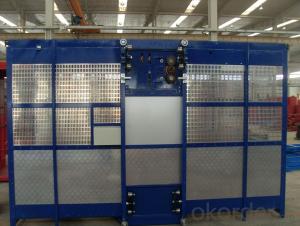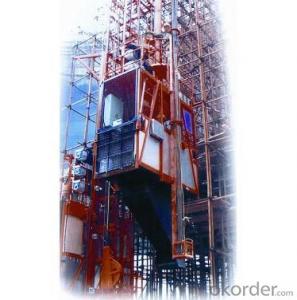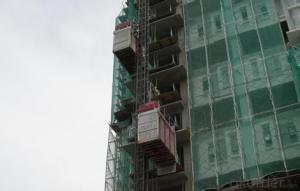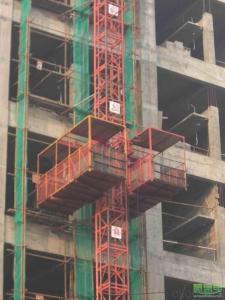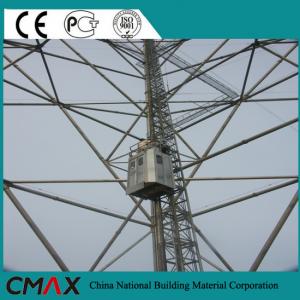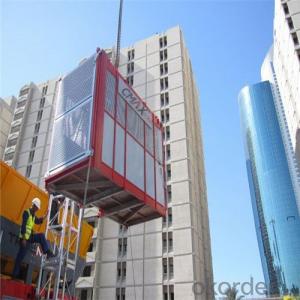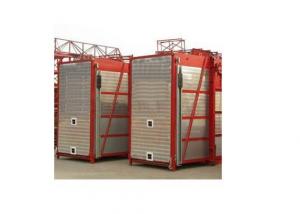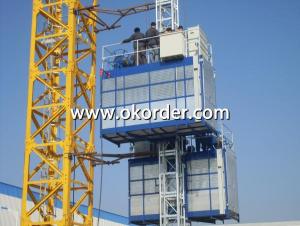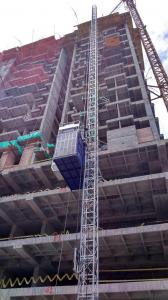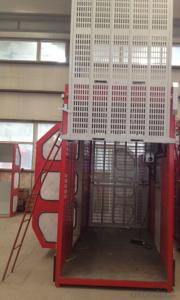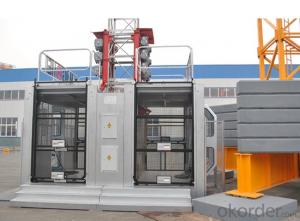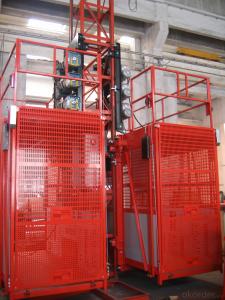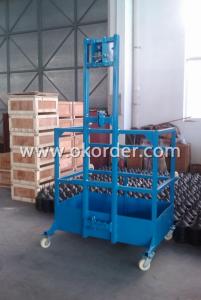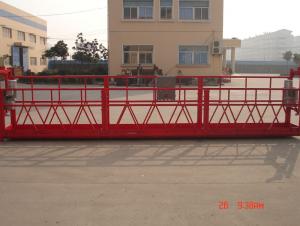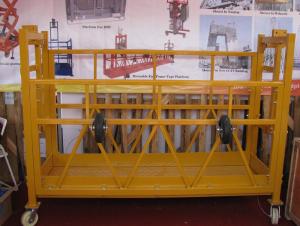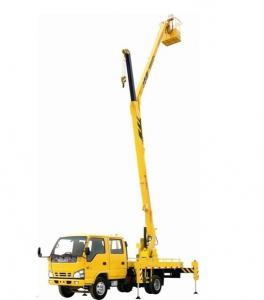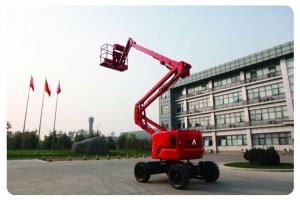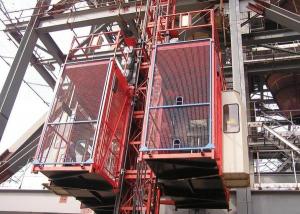Construction Machinery Hoist (SC200/200)
- Loading Port:
- China main port
- Payment Terms:
- TT OR LC
- Min Order Qty:
- 1 set
- Supply Capability:
- 1000 set/month
OKorder Service Pledge
OKorder Financial Service
You Might Also Like
Structure of Construction Machinery Hoist (SC200/200)
Model NO.:
Type:
Application:
Sling Type:
Main Girder Form:
Power Source:
Moving Type:
Installation:
Certification:
Condition:
Max.Lifing Load:
Max.Lifting Height:
Main Power Source:
Cage Size:
Cage:
Mast of Section:
Color:
Warranty:
Total Power:
Max. Free End Height of Guides:
Export Markets:
Construction Machinery Hoist (SC200/200) Specifiction
| m/min | 0-96 | ||
| Free standing height | m | 50 | |
| Max. Lifting Height | m | 400 | |
| Max. Free End Height of Guides | m | 7.5 | |
| Modulus | 8 | ||
| Carriage Weight | kg | 1012×2 | |
| Size of Carriage | m | 3×1.3×2.3 | |
| Standard Knot Weight | kg | 146 | |
| Dimension of mast section | m | 0.65×0.65×1.508 | |
| Motor | |||
| Rated Power | Kw | 3×18.5 | |
| Rated Rotate Speed | r/min | 1460 | |
| Reducer | Center Distance | mm | 125 |
| Ratio | 1:16 | ||
| Over speed Governor | Type | progressive type | |
| Model | SAJ40-1.2A safety device | ||
| Operation Speed | m/min | 51.6 | |
| Brake Moment | N.m | ≥3000 | |
| Lifter Weight | t | 22 | |
Construction Machinery Hoist (SC200/200) Images
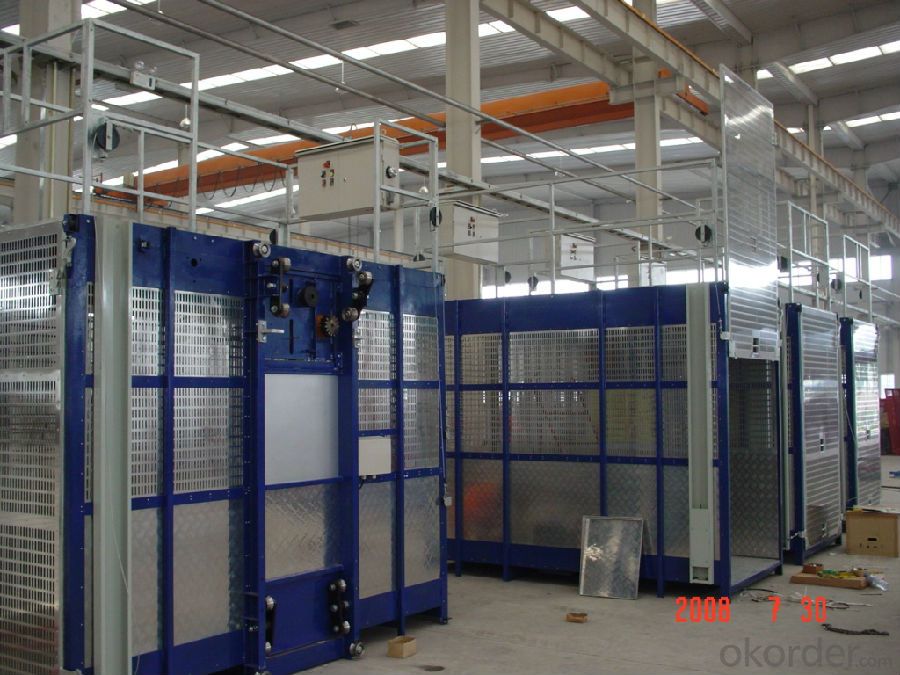
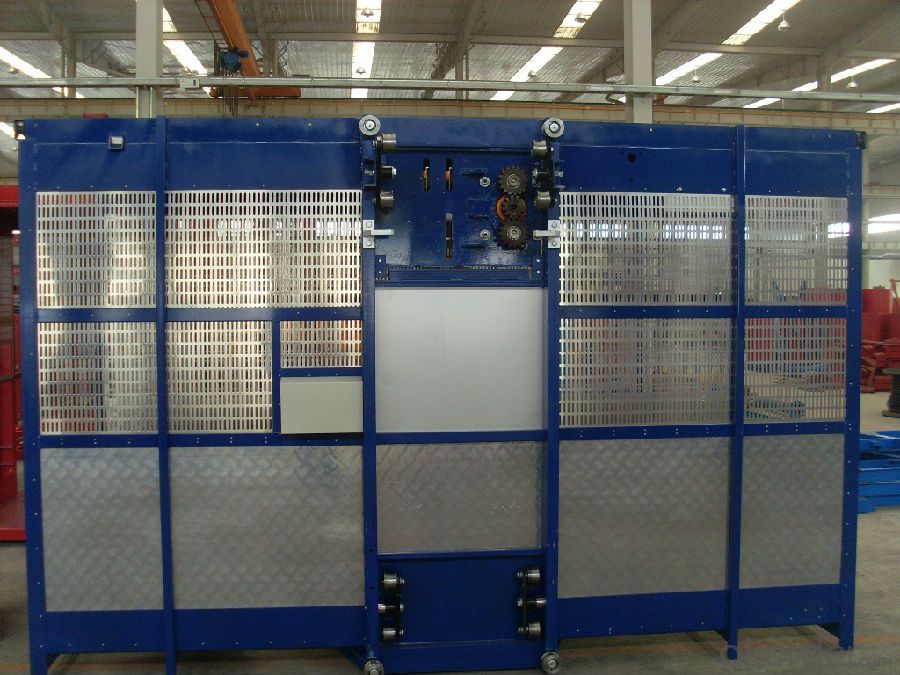
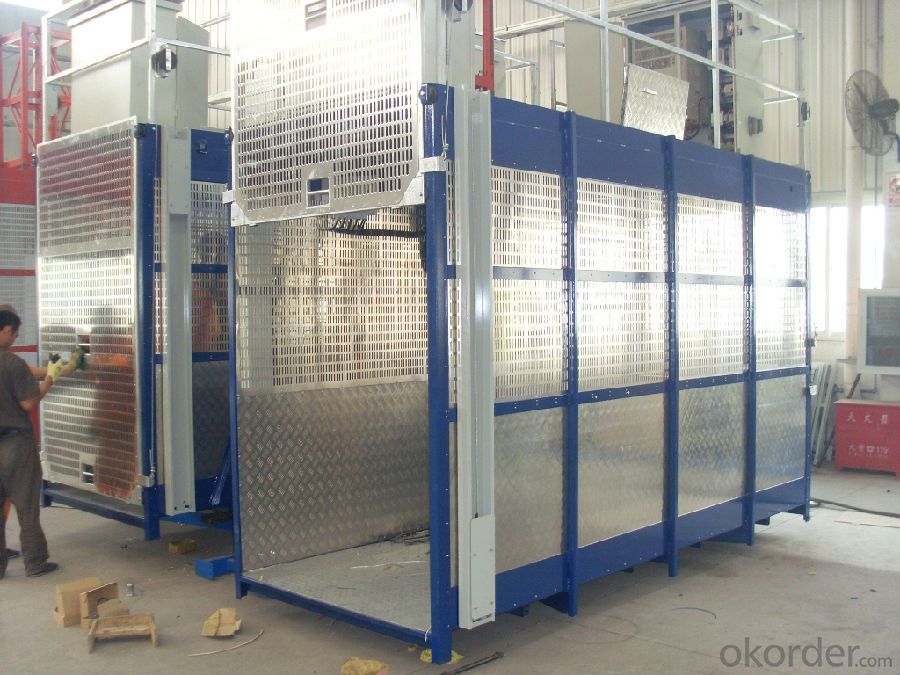
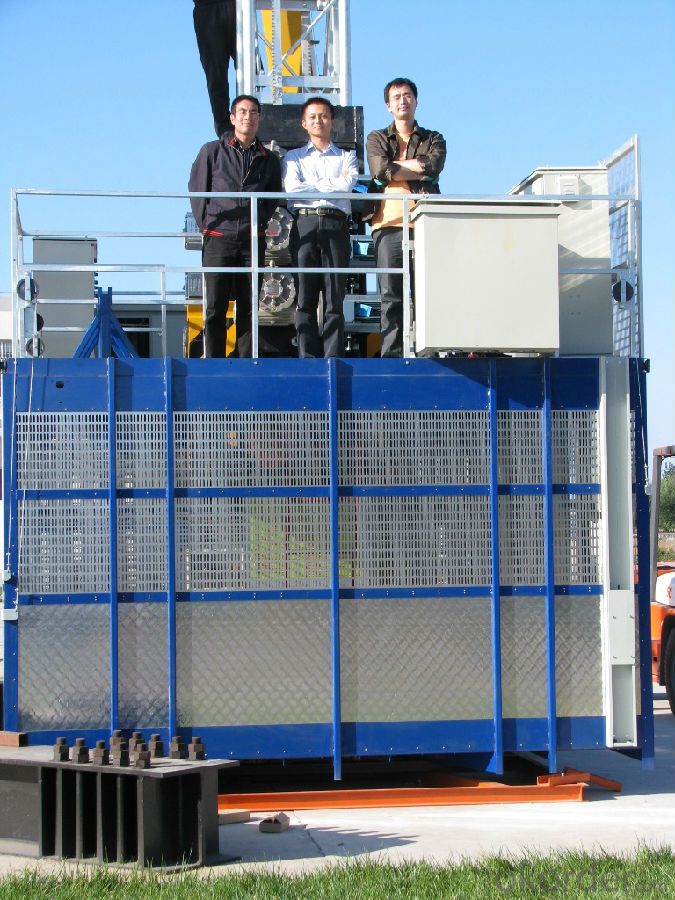
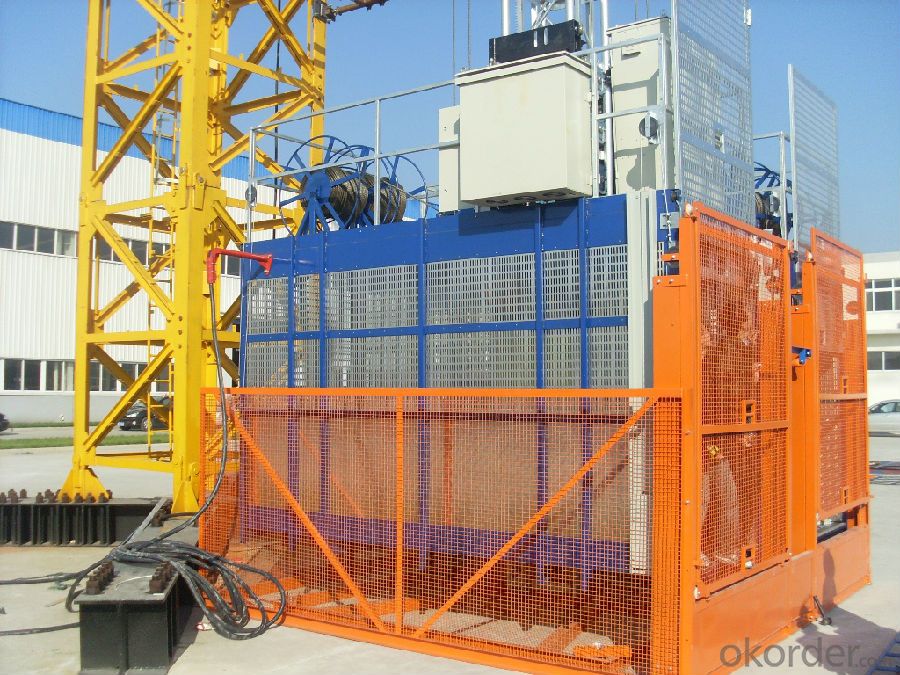
FAQ of Construction Machinery Hoist (SC200/200)
Q: What is the Construction Machinery Hoist (SC200/200) main purpose?
A: Construction Machinery Hoist (SC200/200) equipped with double or single cabin to transport the materials and labors up and down. It's the ideal
construction equipment for vertical transportation in the field of construction.
Q: What is the main structure of building hoist?
A: The P/M construction hoist mainly contains metal structure, driving system, electrical control system, cable guide &
protection system, electrical top crane and safety device.
Q: What is the meaning of the Construction Machinery Hoist (SC200/200) code?
A: Take SC200/200 for example: “SC” stands for rack and pinion hoist, “200/200” stands for double cage and capacity
is 2 tons per cage. “SC200” stands for single cage and capacity is 2 tons.
Q: What is the dimension of the cage?
A: Normally the cage dimension is 3X1.5X2.5M (L/W/H) for 2t type hoist. Details should be checked according to our
quotation sheet. Also, the size can be customized according to the factual site condition. There are two doors (entrance
& exit doors) for each cage, It can be produced as up & down sliding or ramping model for safety and convenience
- Q: Is it possible to fix a building hoist or substitute it with alternative lifting machinery?
- <p>Yes, a building hoist can be repaired if the damage is not severe. If repair is not feasible or cost-effective, it can be replaced by other types of lifting equipment. There are various alternatives available, such as cranes, forklifts, and material hoists, each with its own advantages and suitable for different scenarios. The choice depends on factors like the weight of the load, the height of the building, and the specific requirements of the construction project. It's essential to consider safety, efficiency, and compatibility with the existing infrastructure when making such decisions.</p>
- Q: This question seeks to understand the distinctions among various types of building hoists, which are essential in construction for lifting materials.
- <p>Building hoists, also known as construction hoists, are crucial for transporting materials and personnel in construction projects. The main types include: 1) Goods Hoists, designed for lifting materials and equipment, often with a higher load capacity. 2) Personnel Hoists, specifically for workers, prioritize safety features. 3) Material Hoists, a combination of goods and personnel hoists, allowing both material transport and worker movement. 4) Electric Chain Hoists, powered by electricity, known for their efficiency and control. 5) Manual Chain Hoists, requiring manual operation, useful in areas with no power supply. 6) Electric Winch Hoists, offering high lifting speeds and capacities. Each type varies in capacity, speed, control mechanisms, and power source, impacting their suitability for specific construction needs.</p>
- Q: Is it possible to utilize a building hoist for the purposes of renovation projects?
- <p>Yes, a building hoist can be used for renovation work. These hoists are designed to lift and lower materials and personnel efficiently, making them ideal for construction and renovation projects. They help in moving heavy materials such as bricks, cement, and tools to different floors without the need for manual labor, thus increasing safety and productivity. However, it's crucial to ensure that the hoist is properly installed, maintained, and operated by trained personnel to avoid accidents and ensure the safety of all involved.</p>
- Q: What is the main function of the construction elevator safety guard
- Falling to a certain speed will automatically card death
- Q: This question asks whether a hydraulic building hoist can be used in both indoor and outdoor environments and seeks reasons for its versatility.
- <p>A hydraulic building hoist can be used both indoors and outdoors. These hoists are designed to be versatile and durable, capable of withstanding various weather conditions when used outdoors. They are also compact and can be easily maneuvered in indoor spaces. The primary reason for their versatility is the robust construction and the ability to handle different loads with precision. Additionally, hydraulic systems are less affected by electrical interference, making them suitable for environments with fluctuating power supplies. However, it's important to ensure that the hoist is properly maintained and protected from extreme weather conditions to prolong its lifespan and ensure safety.</p>
- Q: Can a building hoist be utilized for lifting objects that exceed manual lifting capabilities?
- <p>Yes, building hoists are specifically designed to lift and transport objects that are too large or heavy for manual lifting. They are commonly used in construction to move materials and equipment to various levels of a building. Building hoists are equipped with safety features and can handle substantial weight, making them an essential tool in construction projects where heavy objects need to be moved efficiently and safely.</p>
- Q: This question asks for methods to prevent leakage in hydraulic cylinders used in building hoists.
- <p>To prevent hydraulic cylinder leaks in a building hoist, follow these steps: Regularly inspect and maintain the hydraulic system to ensure all seals and gaskets are in good condition. Replace any worn or damaged components promptly. Ensure the hydraulic oil is clean and at the correct level to avoid air bubbles or cavitation which can cause leaks. Check the cylinder rods for scratches or damage and polish or replace them if necessary. Maintain the correct operating pressure and avoid overloading the hoist. Regularly lubricate moving parts to reduce friction and wear. Implement a routine maintenance schedule to catch and address potential issues before they lead to leaks.</p>
- Q: When building tall buildings, the machine that USES to lift concrete to wait for tall building
- It should be the ground pump, the center is the tower crane, the construction face is the concrete pump of the cloth machine to the construction method. The advanced cloth machine is the arm bracket of the pump car, can operate with the remote control, is as convenient as the pump car.
- Q: This question asks if building hoists can be utilized both indoors and outdoors, and if they can operate under windy or rainy weather conditions.
- <p>Building hoists can be used both indoors and outdoors, but their operation in windy or rainy conditions depends on specific safety guidelines and the hoist's design. Outdoor hoists must be designed to withstand weather conditions and should be equipped with weatherproof covers to protect against rain and wind. In windy conditions, hoists may have operational limits based on wind speed to ensure safety. It's crucial to follow the manufacturer's guidelines and local regulations regarding weather conditions to prevent accidents and ensure the hoist's safe operation.</p>
- Q: Construction site construction elevator and tower crane, which unit security check and acceptance?
- The inspection, inspection, inspection and acceptance of the inspection station shall not be put into operation
Send your message to us
Construction Machinery Hoist (SC200/200)
- Loading Port:
- China main port
- Payment Terms:
- TT OR LC
- Min Order Qty:
- 1 set
- Supply Capability:
- 1000 set/month
OKorder Service Pledge
OKorder Financial Service
Similar products
Hot products
Hot Searches
Related keywords
